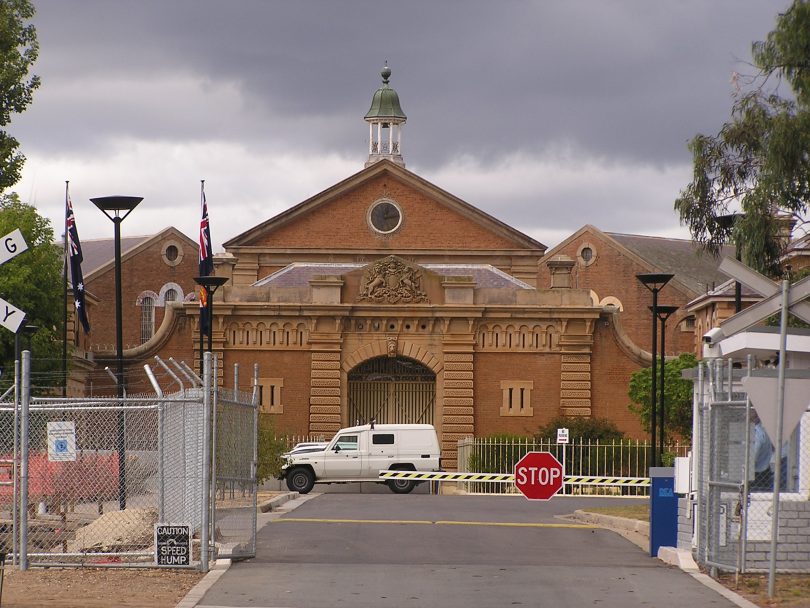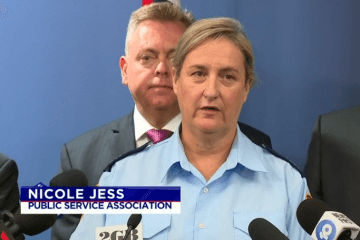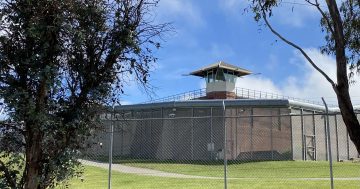
Staff at Goulburn Correctional Centre are on the brink of striking, according to a union boss. Photo: File.
A union boss says staff at Goulburn’s Supermax prison are on the brink of striking after losing senior ranking officers and the recent squashing of an alleged assault on three officers by an inmate.
Chair of the Prison Officers’ Vocational Branch of the Public Service Association of NSW, Nicole Jess, said tensions have been rising since Corrective Services NSW transitioned the assistant superintendent rank in jails to functional manager roles, cut staff numbers and made positions casual.
She claimed the changes have led to fewer senior ranking officers in jails and more young recruits, who were happy to take on casual contracts, replacing the experienced, retiring staff.
“We have a lot more new recruits who are quite young and, I would say, lacking in life experience than we had when there were more permanent positions,” said Ms Jess.
“It takes a certain person with a certain skill set to be able to do what we do, and we believe someone with a military background would be perfect, but they’re not going to leave the military to come into a casualised workforce. They want job security for their families.
“You wouldn’t casualise judges or the police so why would you casualise the back end of the judicial system? Especially when you are holding large amounts of maximum-security inmates who are volatile.”

Union boss Nicole Jess has called for talks with the Commissioner of Corrective Services NSW and the NSW Corrections Minister. Photo: Prison Officers’ Vocational Branch.
The union fought workplace casualisation in 2012 but lost. Now it’s calling on the government department to increase the number of permanent roles to 70 per cent of the workforce.
However, Corrective Services NSW says Goulburn Correctional Centre already meets that quota.
“There are almost 240 permanent ongoing custodial staff at Goulburn Correctional Centre, which is well in excess of 70 per cent of all staff,” said a spokesperson for Corrective Services NSW.
“Our absolute priority will always be the safety and security of our staff. Our staff are well trained, of varied ages, and do an excellent job in maintaining the good order of the prison.
“Casual officers are a valued asset to all prison operations as they can be called upon as required to fill in any staff shortages.”
Adding to frustrations at the jail has been the recent not-guilty finding in Goulburn Local Court in a case against an inmate charged with four counts of assaulting a law enforcement officer.
Ms Jess said the court found the officers hadn’t applied the correct force outlined in their policy. The union is hoping to convince the Director of Public Prosecutions to appeal the ruling.
The issues brewing in Goulburn Correctional Centre aren’t confined to that jail, she said, with staff across NSW “on the brink of striking and wanting industrial action”.
“We’re in a really hard spot at the moment,” said Ms Jess. “We’ve had multiple incidences in the past four months, including the COVID-19 situation; five riots; an increase in assaults on officers; two hostage situations; a stabbing; the Wollongong incident where an inmate took the gun and shot himself; the Lismore incident [where a prison officer has been charged with manslaughter]; and workers’ compensation has gone through the roof.”
One of those five riots was at Goulburn Correctional Centre in April 2020. Inmates at Goulburn threw canned food at prison officers and lit several small fires after they were placed in lockdown, which meant they weren’t allowed visitors due to COVID-19.
More than 200 staff at Goulburn jail were also among the 3000 officers who walked off the job in March 2019 citing safety, security and staffing issues following several assaults on colleagues.
Ms Jess said the union believes the department’s focus remained on inmates’ recidivism rather than the safety and security of staff.
“The department needs to sit down and really look at what’s happening in jails,” she said. “We’re losing control of all of our jails because the department is too focused on issues surrounding KPIs, monetary savings and programs for inmates while we are being assaulted.”
However, Corrective Services NSW defended its position by saying it was tasked with a Premier’s Priority to reduce reoffending by five per cent by 2023.
“That means we’re committed to providing inmates with appropriate programs and skills so they can be functioning members of the community when they’re released from prison,” said the spokesperson.
“As a government department, it is important we provide good value public service. Providing inmates with a purposeful routine of daily programs and education also makes our prisons safer.”










